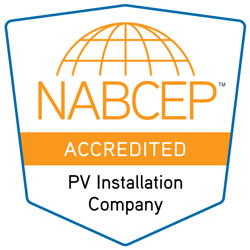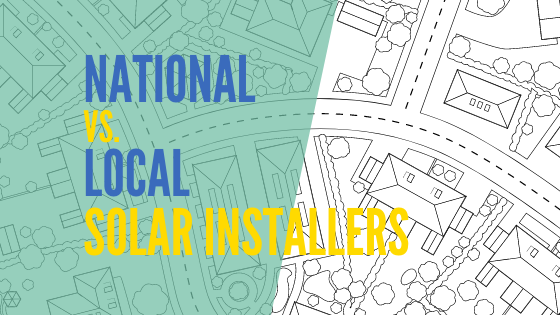When you’re looking for a solar installer, you’re going to want a company that provides great service, does quality work, and offers a fair price. You’ll have your choice between large companies that operate on a national level, and smaller companies that are local and regionally based. Of these two types of solar installers, which one is more likely to give you a great deal on a great system?
In this blog, we’ll take a look at how the size of the solar company can determine how much you’ll pay for your system, the level of workmanship you can expect, and what financing options are available.
Before we jump in, it needs to be stated that Paradise Energy Solutions does fall in the local solar installer category. But you can be confident this blog is written based on experiences and research not our biased opinion.
How do national and local solar installers compare?
Who Will Be Less Expensive?
While there are several factors that create an appealing solar proposal, more often than not, the installation price is one of the most significant. All things equal, you’d much rather go with the company who can install your system for less. Studies have shown that there is often a trend in the price differences between local companies and national companies. And the type of company that typically is more expensive may be surprising.
While national companies have more resources, more projects, and the benefit of economies of scale, they typically won’t be offering the lower price. According to a study by National Renewable Energy Laboratory (NREL), larger solar installers gave customers a higher quote 70% of the time compared to smaller, local installers. And these quotes were about 10% more on average.
Why is this? Unlike smaller companies, many are publicly traded and are held accountable to their shareholders and investors to maintain a specific profit margin. So we can speculate that national firms are more likely to base their pricing on the company’s market share and financial goals.
Smaller local companies, however, face less pressure and less red tape regarding pricing and profit criteria than larger companies. Each project is important to a local installer. While a handful of 10 kW residential systems are just a drop in the bucket for large, national companies.
Who Will Do Better Work?
The larger installers have more projects associated with their company than the local guys. But does that mean they’re more experienced or capable of doing better work? After all, even if it ends up costing a little extra, some solar customers are more comfortable going with a company they feel will give them the best system.
But if you opt for a national installer, they may not be the ones doing the installation. While they may have regional offices across the country, they don’t always have a team of installers that can service these locations. Oftentimes, large installers will hire subcontractors to do their installation work. And while they’ll surely do a great job selecting and managing experienced subs, the accountability is a little different than with a local company.
Local solar installation teams may have one central office or a handful of offices spread across a region. They are more likely to fully staff those office locations with their own installers. Unlike subcontractors, these installation teams are held accountable by the owner of the company that sold you your system.
In these smaller companies, even the newest solar installation technician could know the owner of the company. This tight-knit environment fuels teamwork and motivates employees to do a better job. If they don’t perform up to the company’s expectations, they’re answerable directly to the leadership of the company.

When choosing a solar installer, one way to see how experienced and qualified an installation company is is to take a look at their industry certifications and registrations. Look for certifications from the North American Board of Certified Energy Practitioners, or NABCEP. NABCEP is one of the leading professional development and accreditation organization in the solar industry.
Companies may also mention if they’re affiliated with any other solar energy education organization, such as Solar Energy International (SEI). Take a look at the company’s about us or team page on their website to see how highly they value training and continuing education.
Another thing to take a look at is the company’s online reviews. From Google to Facebook to sites like SolarReviews.com, learn from people who have been in your shoes and made the decision. Many customers enjoy the personal, relationship-based approach that working with a local company offers.
Who Offers More Financing Options?
When it comes to installing solar, you’ll have a few different options for financing: solar ownership, or solar leasing. The most beneficial in the long term is typically solar ownership. This is where you purchase and own your solar system and get 100% of the tax benefits and free electricity throughout the lifespan of the system.
With local solar installers, this is often the only option. Ownership pays off really well in the long term, but it does require a significant upfront investment.
With larger, national installers, you may have the option for a lease, or a Power Purchasing Agreement (PPA). With a PPA, a company will pay to have a solar system installed on your property. In return, they’ll offer you the electricity generated by their solar system for a price lower than your electric bill. So there’s still a solar system on your property, and you’re still getting power from it, but instead of paying the utility company, you’re paying the leasing company for that electricity.
These contractual agreements can last 20 to 25 years and could include escalations in the price of electricity. While you may save a ton of money in the first couple of years, you need to be aware the agreement could include a price increase down the road. Because you don’t own this solar system, the PPA company will get all the tax benefits from the system. However, they’ll be responsible for the initial installation costs and maintenance.
Which Solar Installer Is Best For You?
The information we touched on are general trends often seen in the industry, but not telling for every situation. It’s always a great idea to get quotes from several companies. The more information and options you have, the more likely it is that you’ll get a great system for a fair price.
There are fantastic solar installation companies of all sizes that can install an efficient, long-lasting system that will meet your energy and financial goals. Likewise, there are companies of all sizes that you may be better off avoiding. The best way to find out is to start requesting your quotes!
If you're not ready just yet for a quote, the next best step is to download our solar buying guide. This guide answers many of the common questions people have when examining a solar investment.




